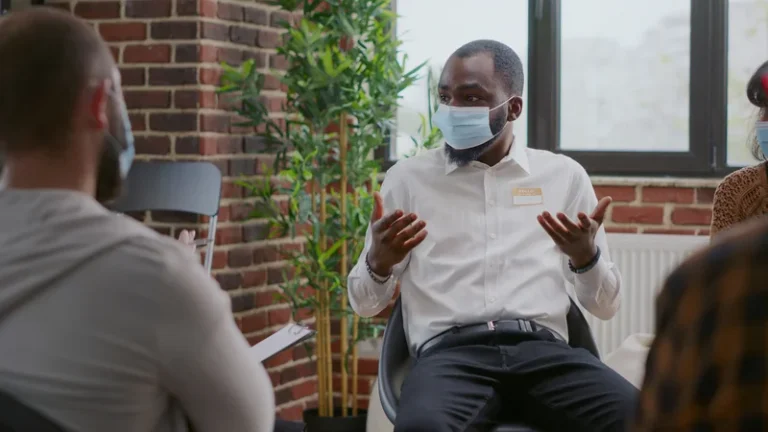Sober living
The 30 Best Substance Abuse Group Activities

In this experiential activity for group therapy, participants are encouraged to use paints, pencils, or other materials to create images that represent their feelings or experiences in recovery. Art therapy allows for emotional release and fosters self-expression, without the need for words. The role of innovative group activities in sustaining long-term recovery is significant.

Exploring Healthy Relationships
- These sessions allow individuals to externalize their internal struggles, often revealing insights that verbal communication alone might miss.
- It’s like a real-time strategy game where the goal is developing better coping mechanisms.
- These exercises can be particularly effective in the early stages of recovery, helping participants stay focused and motivated, ultimately supporting their mental health.
- Overall, family involvement is a vital component of group therapy, providing additional support and understanding that can significantly enhance the recovery process.
They tend to have more structure than process groups and focus on a single topic. Two Dreams prefers to hold process groups in order to enhance the holistic treatment experience and to help clients equip themselves with the tools needed for their own recovery. Other goals of group therapy include gaining inspiration through the recovery of others, self-identifying as a recovering addicting, and examining core values.
- This process not only helps the storyteller but also provides invaluable insights and inspiration for listeners.
- It’s like giving your feelings a physical form, making them easier to understand and process.
- Through this activity, you can encourage your participants to say no to drug use clearly.
- Here are some group therapy ideas for addiction that you may come across in your exploration of it as a tool to help overcome what you’re going through.
Step 7: Relapse Prevention Strategies
Pairing members to practice active listening allows them to repeat and respond with empathy, group therapy ideas for addiction strengthening mutual understanding and reinforcing the group’s supportive environment. Gratitude discussions foster a positive outlook by focusing on what members appreciate. Each week, members share someone or something they’re grateful for, which can shift focus away from stress and reinforce optimism in recovery.
Therapeutic Group Activities for Addiction Recovery

Music therapy is a powerful tool in recovery, as it allows individuals to process emotions through sound. In this experiential activity for group therapy, participants might create music, listen to meaningful songs, or discuss lyrics that resonate with their recovery journey. Music can be a form of emotional release and can help individuals express feelings they may struggle to verbalize. A mosaic of hope, https://ecosoberhouse.com/ resilience, and camaraderie emerges as addiction recovery groups embrace innovative approaches to foster lasting sobriety.
Learning to Say No

Substance abuse recovery is a challenging journey that requires both heroin addiction personal and communal support. Group therapy offers a vital space for individuals in recovery to connect, learn, and grow together. An effective substance abuse group therapy session provides a supportive and judgment-free environment, encourages open discussions, and promotes healthier ways of coping. Here, we present 50 essential group topics that can deepen group engagement, foster meaningful discussions, and support long-term recovery. Group therapy plays an essential role in substance abuse recovery, providing a space where individuals can share experiences, learn new coping strategies, and support each other’s journey to sobriety. Structured activities within these groups are highly effective in promoting personal growth, enhancing self-awareness, and building strong community bonds that can bolster resilience.
Utilizing journaling prompts can guide individuals to explore their thoughts and feelings, promoting emotional healing and self-awareness. These prompts can help participants delve into their behaviors and triggers, offering valuable insights that support their recovery. Self-reflection and personal growth are essential components of the recovery journey. Group therapy activities that encourage self-reflection can help individuals gain insights into their emotions, behaviors, and motivations. By addressing cultural issues and providing tailored interventions, community-based groups offer valuable support for individuals in recovery. These groups help participants build strong support systems, fostering a sense of belonging and enhancing their commitment to long-term sobriety.
Top Group Ideas for Substance Abuse Treatment & Recovery
Sessions may occur anywhere from daily to monthly, depending on the level of care. For example, intensive outpatient treatment may require meeting twice a week, while inpatient programs may offer daily sessions. You can prepare for these situations by roleplaying as a group therapy activity. Group members will act out the events while discussing how to handle conflicts and achieve the healthiest outcome. Some recovery groups promote emotional openness by playing feelings charades.
- This topic covers various techniques, such as deep breathing, journaling, and physical exercise, and encourages members to share personal coping strategies that have been effective for them.
- Group therapy activities that encourage self-reflection can help individuals gain insights into their emotions, behaviors, and motivations.
- Connecting with nature can be deeply healing, and this experiential activity for group therapy combines physical activity with mindfulness.
- Our substance abuse treatment programs offer mental health counseling, medication-assisted treatment, and other evidence-based services to help you or your loved one stay sober.
- Having a foundation for how to handle conflict can help prevent emotions or worries from taking over when conflict arises in life.

In these group sessions, a licensed, trained professional therapist leads group therapy, ensuring that the therapeutic process is effective and ethical. Additionally, exploring various group therapy ideas can enhance the overall experience. Drumming circles are a rhythmic experiential exercise for group therapy that promotes unity, expression, and stress relief. Each participant takes part in creating a communal rhythm, and the collective sound becomes a symbol of shared experience. Drumming can serve as a powerful outlet for releasing emotions and fostering a sense of togetherness in the group. Women-only and men-only groups allow for open discussions of gender-specific issues in recovery.
Anger Management Techniques
- Physical health is a popular replacement for addiction that many take advantage of.
- Consider factors such as the therapist’s approach (e.g., Cognitive Behavioral Therapy or Motivational Interviewing), availability for regular sessions, and client reviews.
- This session discusses the importance of setting personal boundaries and provides strategies for communicating them effectively with others.
- Engaging in creative activities allows individuals to explore underlying issues related to substance abuse, helping them understand and address their triggers and behaviors.
Practicing these scenarios helps participants build confidence in handling real-life challenges, making role-playing a key component of effective group therapy. Health and wellness education sessions round out the holistic approach to recovery. From nutrition to exercise, these groups emphasize the importance of physical health in maintaining sobriety.
Practicing gratitude has proven benefits for mental and physical health, and it can boost recovery by helping people focus on the positives. As individuals continue in recovery group activities, they begin to develop very strong bonds with one another. The implementation of new and challenging activities for group members helps to strengthen those bonds. Pass out pieces of paper with drawings of a large bottle on them, and two lines are drawn across the bottle to create three different layers inside. Make it clear that participants do not have to share anything they write, so they’ll feel free to explore potentially surprising emotions.
